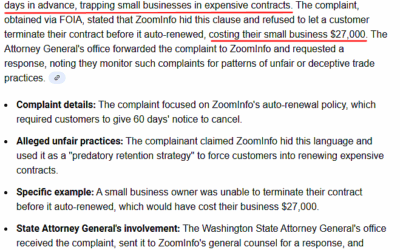How can a B2B Data Platform Supercharge Your Go-To-Market Strategy?
A well-crafted go-to-market (GTM) strategy is crucial for success. Whether launching a new product, entering a new market, or expanding your customer base, the effectiveness of your GTM plan can make or break your efforts. One of the key components that can significantly enhance your GTM strategy is the use of B2B data platforms. These platforms provide the insights and intelligence needed to target the right audience, personalize your outreach, and ultimately, drive growth. Here’s how B2B data platforms can help you build a winning GTM strategy.
1. Target the Right Audience
The foundation of any successful GTM strategy is identifying and targeting the right audience. B2B data platforms offer detailed information on companies, including firmographics, technographics, and decision-maker contacts. This data allows you to segment your market more effectively, ensuring that your marketing and sales efforts are focused on the most relevant prospects. By narrowing down your target audience, you can allocate resources more efficiently and increase the likelihood of converting leads into customers.
2. Enhance Personalization
Personalization is no longer just a nice-to-have—it’s a necessity in modern B2B marketing. B2B data platforms provide the insights needed to tailor your messaging to the specific needs and pain points of your target audience. Whether it’s understanding a prospect’s industry challenges or identifying the technologies they use, this data enables you to craft personalized content that resonates. Personalization not only improves engagement but also builds trust, making prospects more likely to move down the sales funnel.
3. Optimize Account-Based Marketing (ABM)
Account-based marketing is a powerful strategy that focuses on targeting high-value accounts with personalized campaigns. B2B data platforms are essential for executing ABM effectively. They provide the data needed to identify key accounts, understand their organizational structure, and map out the decision-making hierarchy. With this information, you can create hyper-targeted campaigns that address the specific needs of each account, increasing the chances of closing large deals.
4. Streamline Lead Scoring and Qualification
Not all leads are created equal, and prioritizing high-quality leads is essential for a successful GTM strategy. B2B data platforms can help you develop a robust lead scoring system by providing detailed insights into a prospect’s company size, industry, revenue, and more. This data allows you to score leads based on their likelihood to convert, ensuring that your sales team focuses on the most promising opportunities. By improving lead qualification, you can reduce the sales cycle and increase conversion rates.
5. Gain Competitive Insights
Understanding your competitors is critical to developing a strong GTM strategy. B2B data platforms offer valuable competitive intelligence, such as market share analysis, product offerings, and customer reviews. This information allows you to identify gaps in the market, differentiate your offerings, and position your products or services more effectively. With a clearer understanding of the competitive landscape, you can craft a GTM strategy that sets you apart from the competition.
6. Improve Sales and Marketing Alignment
A successful GTM strategy requires close alignment between sales and marketing teams. B2B data platforms facilitate this alignment by providing a single source of truth for both teams. With access to the same data, sales and marketing can collaborate more effectively, ensuring that messaging is consistent and that both teams are working towards the same goals. Improved alignment leads to more cohesive campaigns, better lead handoff, and ultimately, higher conversion rates.
7. Measure and Refine Your Strategy
The ability to measure the effectiveness of your GTM strategy is crucial for continuous improvement. B2B data platforms offer robust analytics and reporting tools that allow you to track key metrics, such as engagement rates, lead conversion rates, and revenue growth. By analyzing this data, you can identify what’s working and what’s not, making it easier to refine your strategy and achieve better results over time.
Why Lead411 is the B2B Data Platform of Choice for GTM Success
When it comes to choosing a B2B data platform to support your GTM strategy, Lead411 stands out as a proven solution. Many successful companies have relied on Lead411 to power their go-to-market efforts, leveraging its comprehensive database and advanced search capabilities to identify and target high-value prospects. With accurate and up-to-date data, Lead411 ensures that your sales and marketing teams are always equipped with the insights they need to drive growth. By integrating Lead411 into your GTM strategy, you can streamline your processes, enhance personalization, and ultimately, achieve better results.
Incorporating a B2B data platform like Lead411 into your GTM strategy can make all the difference. From identifying the right audience to optimizing your campaigns, these platforms provide the tools and insights needed to execute a successful go-to-market plan. Don’t leave your GTM strategy to chance—empower it with the right data and watch your business thrive.
Recent Posts
Top 5 B2B Data Providers for Energy / CleanTech Companies in 2026 (Reviewed)
Article Summary Energy and clean technology companies need accurate, industry-specific B2B data to identify active projects and decision-makers. The best B2B data providers offer more than contact lists, including intent signals, growth triggers, and verified...
Top 5 B2B Data Providers for Staffing and Recruiting Companies in 2026 (Reviewed)
Summary: For staffing and recruiting firms, having accurate, up-to-date B2B data is essential. Whether you’re targeting HR directors, hiring managers, or C-suite executives, a high-quality data provider can save hours of research and give you a competitive edge. In...
Why Zoominfo Contracts are Hard to Cancel
Quick Summary ZoomInfo contracts often come with long-term commitments and annual billing. Automatic renewals and strict cancellation policies make terminating services tricky. Unused credits and account manager retention efforts can further complicate cancellation....




